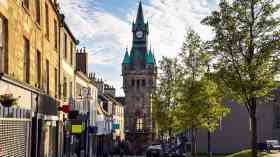Since 1987, Mantair Ltd has been providing trusted, compliant, and environmentally responsible wastewater treatment solutions across the UK.
Councils failing to monitor air pollution around schools, BLF says
The British Lung Foundation (BLF) has claimed that councils are failing to monitor schools in Britain for dangerous air pollution, despite government advice to do so.
The BLF submitted a series of freedom of information (FoI) requests to 433 local authorities. Of the 322 which replied, only 140 confirmed that they had placed pollution monitors within 10 metres of school grounds.
In particular, urban areas identified by the World Health Organisation (WHO) as having harmful levels of pollution, contained a number of councils which only kept track of one or two schools’ surrounding pollution levels.
The survey identified ‘alarming discrepancies’ in council behaviour, with some using simple diffusion tubes to measure NO2 gas, and others are monitoring different-sized particles called PM10s and 2.5s which, which are produced by traffic and industry.
A spokeswomen for the BLF said: “The guidance on monitoring that Defra gives local authorities needs to be revised and strengthened. Parents should be able to tell what their children are breathing, especially if they have conditions like asthma.
Russell Hobby, general secretary of the National Association of Head Teachers, said: “Children and teaching staff are not being made fully aware of the health risks posed by air pollution. Local authorities need clear guidance to monitor the air that children breathe as well as more resources and funding to tackle it.”
Dr Penny Woods, chief executive of British Lung Foundation, added: “Children’s lung health is particularly vulnerable to air pollution, yet they are not being protected by the government’s air quality monitoring guidance. There is a huge discrepancy in the levels of monitoring outside schools across the country, with many schools in the most harmfully polluted places not being monitored.
A spokesman for the Local Government Association said: “Councils follow guidelines on monitoring air pollution which are laid down by central government. These are to take a risk-based approach – monitoring those locations where members of the public might be regularly exposed.
“As well as schools this could also include residential properties, hospitals and care homes – depending on which area is at greatest risk. Many schools are actually some distance from busy roads and therefore unlikely to have high air pollution levels.”
Event Diary
Retail Supply Chain & Logistics Expo returns to Excel London across 12-13 November, once again bringing together the world of logistics, supply chain, eCommerce and retail innovation for two dynamic days of opportunity.
Every sport, from grassroots football to world-class tournaments, depends on one constant: high-quality playing surfaces and well-maintained green spaces.
Tickets: Free registration available at www.retailscl.com
The Retail Supply Chain & Logistics Expo is the UK’s leading event for retail supply chain and logistics professionals, showcasing the latest innovations in fulfilment, 3PL, AI-driven automation, and warehouse technology.
Supplier Profiles
Bauder Accepts Keys to its New UK Distribution Centre at Gateway 14
Bauder marked a major milestone in its UK expansion with the official handover of a brand
Words of World: Bridging language barriers with excellence
At Words of World, we specialise in professional translation and interpreting, d
Latest Features
The British Institute of Cleaning Science (BICSc) and the Cleaning & Support Services Association (CSSA) have successfully completed a groundbreaking project aimed at exploring the future of cleaning. This collaboration marks a significant milestone in the cleaning industry, reflecting a shared commitment to embracing innovation with confidence.
The Crown Commercial Service’s (CCS) new framework on Language Services (RM6302), dealing with translation, transcription and interpreting, is live, running from 7th May 2025 to 6th May 2028.















